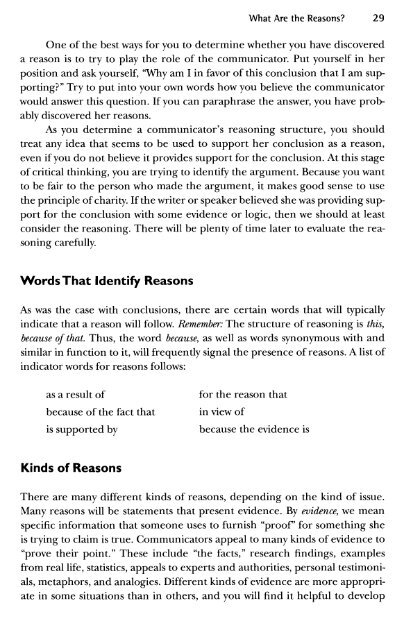Asking the Right Questions, A Guide to Critical Thinking, 8th Ed
Asking the Right Questions, A Guide to Critical Thinking, 8th Ed
Asking the Right Questions, A Guide to Critical Thinking, 8th Ed
Create successful ePaper yourself
Turn your PDF publications into a flip-book with our unique Google optimized e-Paper software.
What Are <strong>the</strong> Reasons? 29<br />
One of <strong>the</strong> best ways for you <strong>to</strong> determine whe<strong>the</strong>r you have discovered<br />
a reason is <strong>to</strong> try <strong>to</strong> play <strong>the</strong> role of <strong>the</strong> communica<strong>to</strong>r. Put yourself in her<br />
position and ask yourself, "Why am I in favor of this conclusion that I am supporting?"<br />
Try <strong>to</strong> put in<strong>to</strong> your own words how you believe <strong>the</strong> communica<strong>to</strong>r<br />
would answer this question. If you can paraphrase <strong>the</strong> answer, you have probably<br />
discovered her reasons.<br />
As you determine a communica<strong>to</strong>r's reasoning structure, you should<br />
treat any idea that seems <strong>to</strong> be used <strong>to</strong> support her conclusion as a reason,<br />
even if you do not believe it provides support for <strong>the</strong> conclusion. At this stage<br />
of critical thinking, you are trying <strong>to</strong> identify <strong>the</strong> argument. Because you want<br />
<strong>to</strong> be fair <strong>to</strong> <strong>the</strong> person who made <strong>the</strong> argument, it makes good sense <strong>to</strong> use<br />
<strong>the</strong> principle of charity. If <strong>the</strong> writer or speaker believed she was providing support<br />
for <strong>the</strong> conclusion with some evidence or logic, <strong>the</strong>n we should at least<br />
consider <strong>the</strong> reasoning. There will be plenty of time later <strong>to</strong> evaluate <strong>the</strong> reasoning<br />
carefully.<br />
Words That Identify Reasons<br />
As was <strong>the</strong> case with conclusions, <strong>the</strong>re are certain words that will typically<br />
indicate that a reason will follow. Remember: The structure of reasoning is this,<br />
because of that. Thus, <strong>the</strong> word because, as well as words synonymous with and<br />
similar in function <strong>to</strong> it, will frequently signal <strong>the</strong> presence of reasons. A list of<br />
indica<strong>to</strong>r words for reasons follows:<br />
as a result of<br />
because of <strong>the</strong> fact that<br />
is supported by<br />
for <strong>the</strong> reason that<br />
in view of<br />
because <strong>the</strong> evidence is<br />
Kinds of Reasons<br />
There are many different kinds of reasons, depending on <strong>the</strong> kind of issue.<br />
Many reasons will be statements that present evidence. By evidence, we mean<br />
specific information that someone uses <strong>to</strong> furnish "proof for something she<br />
is trying <strong>to</strong> claim is true. Communica<strong>to</strong>rs appeal <strong>to</strong> many kinds of evidence <strong>to</strong><br />
"prove <strong>the</strong>ir point." These include "<strong>the</strong> facts," research findings, examples<br />
from real life, statistics, appeals <strong>to</strong> experts and authorities, personal testimonials,<br />
metaphors, and analogies. Different kinds of evidence are more appropriate<br />
in some situations than in o<strong>the</strong>rs, and you will find it helpful <strong>to</strong> develop



